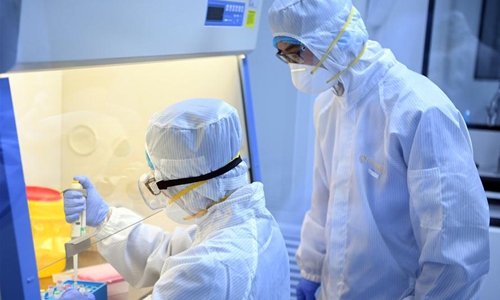HOME >> CHINA
Chinese institute applies for patent for usage of US-made medicine against 2019-nCov
By GT staff reporters Source:Global Times Published: 2020/2/5 16:36:50

Photo:Xinhua
A Chinese research institute in Wuhan announced it had applied to patent a medicine made in the US after discovering it was effective in dealing with the novel coronavirus, triggering debate on Chinese social media over whether the move violates intellectual property regulations.
The Wuhan Institute of Virology under the Chinese Academy of Sciences released a statement on its website on Tuesday, saying their researchers discovered that two medicines Remdesivir and chloroquine could effectively inhibit the recently emerged novel coronavirus (2019-nCoV).
The result has been delivered to related authorities nationwide and requires clinical verifications, read the statement.
Chloroquine is a medicine that has been used to deal with malaria since the 1940s. It has been sold on the Chinese market and can be independently provided, according to the institute.
Meanwhile, Remdesivir, GS-5734, a medicine developed by the US medicine producer Gilead, is in phase two and phase three clinical research into its effectiveness against the Ebola virus in Congo.
In order to protect national interests, the institute said that it applied to patent the discovery that Remdesivir can be used to deal with 2019-nCov and would apply for patents in other countries and regions through the Patent Cooperation Treaty.
The institute called for foreign companies to withhold enforcing their lawful patent rights to help China fight against the coronavirus epidemic.
The Wuhan institute's patent application triggered heated discussions on Chinese social media. Some questioned whether the institute is allowed to apply to patent a medicine made by a US company in China, citing Chinese companies' and institutes' notorious history in allegedly stealing foreign intellectual property.
Experts and lawyers said that the Wuhan Institute of Virology's application is reasonable and lawful according the Patent Law of China, as US company Gilead only lays claims to Remdesivir's chemical compounds, while the Wuhan institute has applied for a method of using the pharmaceutical product.
Whether the patent will be granted by the Chinese National Intellectual Property Administration depends on the assessment of the three elements of a patent: Non-obviousness, novelty as well as utility. The whole process is expected to take about two to three years, Chen Jihong, an expert in patent law at the Beijing Zhonglun Law Firm, told the Global Times on Wednesday.
If the patent is granted, Gilead would have to obtain the license from the Wuhan Institute of Virology to use Remdesivir for the treatment of the new coronavirus, otherwise it will constitute infringement in China, Chen noted.
If Gilead has a future need to use the drug as a treatment for new coronavirus, the two sides could facilitate working together on a cross-licensing agreement, which is very common in international patent licensing practice, as both sides depend on each other, he said.
The Wuhan Institute of Virology called on Gilead to suspend its patent on Remdesivir's chemical compounds during the current tough period in China, and appealed to the foreign pharmaceutical producer to lend a hand in the national fight against the novel coronavirus.
The Wuhan Institute of Virology announced that it would make its patent applications available to major countries around the world through the Patent Cooperation Treaty, to expand the scope of its patent application.
If the Wuhan Institute of Virology's application is approved in China but Gilead declines to license the drug to the Institute to use Remdesivir in the clinical treatment of the new coronavirus, the Chinese National Intellectual Property Administration may force patent licensing, given the current epidemic outbreak emergency across China, the expert said.
In order to prevent, treat and control epidemic diseases, the Chinese National Intellectual Property Administration can grant compulsory licenses in a national emergency and extraordinary situation to protect the public's interests. While the principle is written in Patent Law of China, China has never implemented any such compulsory license, Chen noted.
Although Remdesivir is not yet on the market, the expert said it will not affect patent applications because the drug listing process and patent application process are two separate sets of systems with unrelated standards.
Patents can be applied for the discovery of any new usage of a medicine, as long as it has not been put forward before, Xu Xinming, a Beijing-based lawyer, told the Global Timed on Wednesday.
Although it is lawful to apply for a patent for the usage, Liu Changqiu, a researcher at the Shanghai Academy of Social Sciences, warned that problems related to intellectual property might occur when the medicine is put into clinical use.
At that time, massive production will be required but the medicine will still not be on the Chinese market and Chinese companies will not be allowed to produce it, Liu told the Global Times on Wednesday.
According to officials with the Ministry of Science and Technology, a batch of Remdesivir was expected to arrive in China on Tuesday.
Although the drug had not gone through all the clinical trial procedures for 2019-nCoV abroad, it has shown fairly good in vitro activity in related domestic research, Sun Yanrong, an official of the ministry, said at a press conference held by the National Health Commission on Tuesday.
The National Medical Products Administration has approved the China-Japan Friendship Hospital and the Chinese Academy of Medical Sciences, two Beijing-based applicants for the testing of Remdesivir, to conduct clinical trials on the drug, according to Sun.
Media reported that Gilead is also communicating with Chinese researchers over the possibility of treating 2019-nCoV with Remdesivir and promised to provide the medicine in certain circumstances.
RELATED ARTICLES:
Posted in: SOCIETY